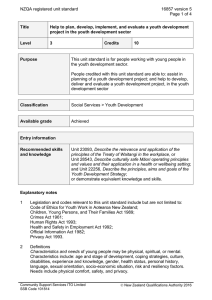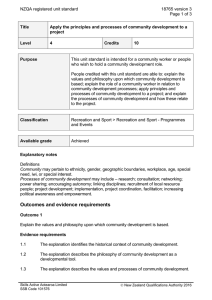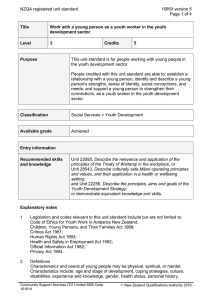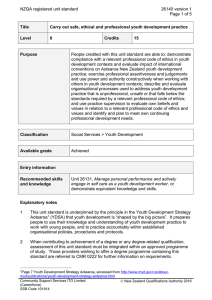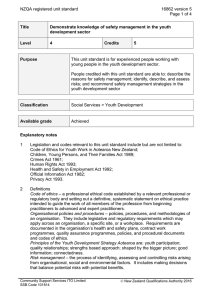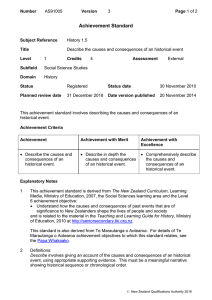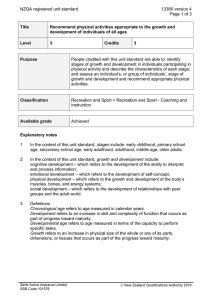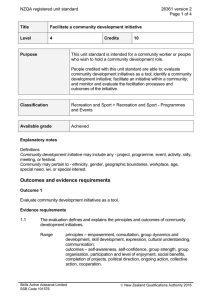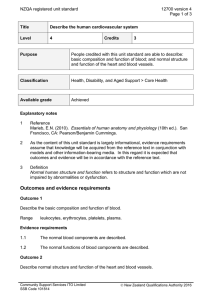NZQA registered unit standard 28538 version 1 Page 1 of 5
advertisement
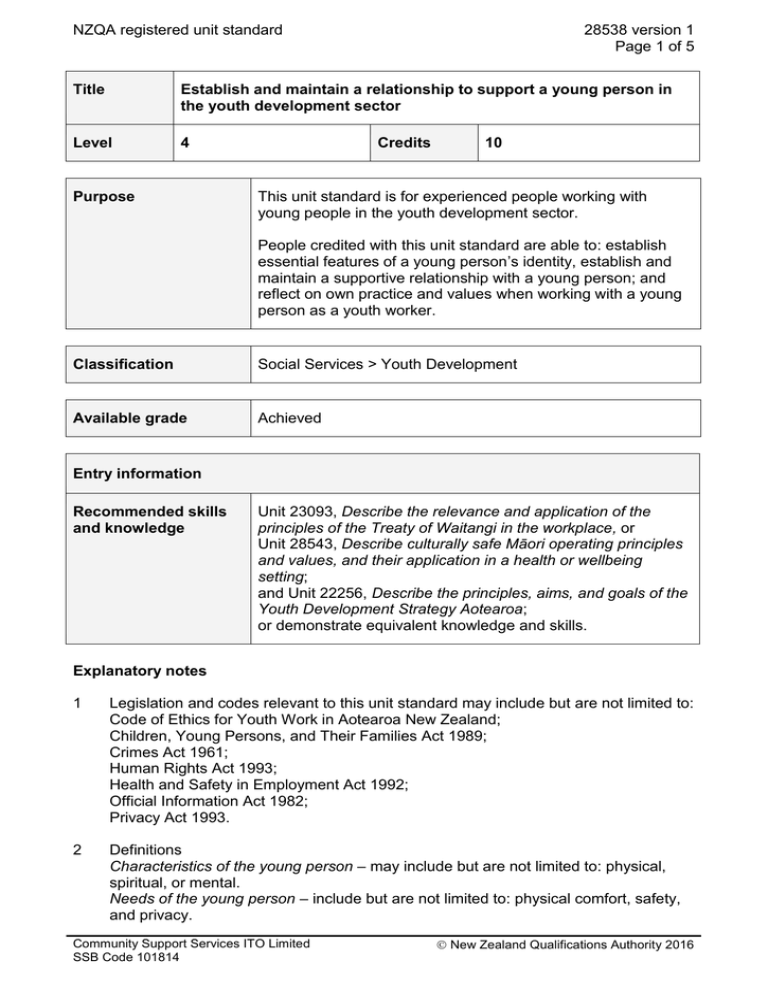
NZQA registered unit standard 28538 version 1 Page 1 of 5 Title Establish and maintain a relationship to support a young person in the youth development sector Level 4 Purpose Credits 10 This unit standard is for experienced people working with young people in the youth development sector. People credited with this unit standard are able to: establish essential features of a young person’s identity, establish and maintain a supportive relationship with a young person; and reflect on own practice and values when working with a young person as a youth worker. Classification Social Services > Youth Development Available grade Achieved Entry information Recommended skills and knowledge Unit 23093, Describe the relevance and application of the principles of the Treaty of Waitangi in the workplace, or Unit 28543, Describe culturally safe Māori operating principles and values, and their application in a health or wellbeing setting; and Unit 22256, Describe the principles, aims, and goals of the Youth Development Strategy Aotearoa; or demonstrate equivalent knowledge and skills. Explanatory notes 1 Legislation and codes relevant to this unit standard may include but are not limited to: Code of Ethics for Youth Work in Aotearoa New Zealand; Children, Young Persons, and Their Families Act 1989; Crimes Act 1961; Human Rights Act 1993; Health and Safety in Employment Act 1992; Official Information Act 1982; Privacy Act 1993. 2 Definitions Characteristics of the young person – may include but are not limited to: physical, spiritual, or mental. Needs of the young person – include but are not limited to: physical comfort, safety, and privacy. Community Support Services ITO Limited SSB Code 101814 New Zealand Qualifications Authority 2016 NZQA registered unit standard 28538 version 1 Page 2 of 5 Code of ethics – an agreed set of foundation or guiding principles established by members of the youth development profession. Codes of ethics may be established by local, regional, or national youth development organisations. Codes of ethics related to youth development include but are not limited to: youth development organisation codes of conduct or ethics, and professional association codes of conduct or ethics. Culture – includes but is not limited to cultures based upon: age, class, disability, ethnicity, gender, group affiliation, sexual orientation, cultures within Māori, Pākehā, Pacific Island, and Asian groupings; including identification with a culture through birth, adoption, or genealogy or whakapapa. Organisational policies and procedures – policies, procedures, and methodologies of an organisation. They include legislative and regulatory requirements which may apply across an organisation, a specific site, or a workplace. Requirements are documented in the organisation’s health and safety plans, contract work programmes, quality assurance programmes, policies, and procedural documents and codes of ethics. Principles of the Youth Development Strategy Aotearoa are: youth participation; quality relationships; strengths based approach; shaped by the bigger picture; good information; connectedness. Youth/young people – people between the ages of 12 and 24. Youth culture – includes but is not limited to any culture a young person identifies with including local, national, and global contexts. Sub-culture – includes any group of youth who are self-identified as a sub-culture or sub-group and may include but are not limited to: skaties; gothics; hip hop; gangs; bogans; boy/girl racers; computer nerds; academics; gamers; ravers; church groups; sporting and recreational groups; uniform groups. Youth development sector – a situation where youth development practice is being used intentionally to promote positive development of young people. Examples include education, sport, community development, religious groups, cultural groups, and interest groups. 3 Resources Martin, Lloyd. (2002). The invisible table: Perspectives on youth and youth work in New Zealand. Palmerston North: Dunmore Press. Ministry of Youth Affairs. (2002). Youth Development Strategy Aotearoa – Action for child and youth development. Wellington: Ministry of Youth Affairs. Available online from the Ministry of Youth Development (http://www.myd.govt.nz), along with supporting documents. United Nations Declaration of the Rights of the Child. Available at http://www.un.org/cyberschoolbus/humanrights/resources.asp. Convention on the Rights of the Child. Available through http://www.unicef.org/crc/. 4 Assessment notes Assessment tasks must be completed in accordance with the principles of the Youth Development Strategy Aotearoa and the Code of Ethics for Youth Work in Aotearoa New Zealand. This unit standard requires a particular depth of disclosure of personal information. All communications with and between people preparing for award of this unit standard must be treated confidentially by accredited providers, and others involved in preparation for assessment. The scope and limits of confidentiality are defined through negotiation, and informed consent, and criteria established by legislation, ethical practice, and organisational policies and procedures. Community Support Services ITO Limited SSB Code 101814 New Zealand Qualifications Authority 2016 NZQA registered unit standard 28538 version 1 Page 3 of 5 Sources of criteria as established by legislation, ethical practice, and organisational policies and procedures include but are not limited to: Official Information Act 1982, Privacy Act 1993, youth development organisation codes of conduct, codes of practice issued by the Privacy Commissioner, youth development codes of ethics, and organisational policies and procedures, strategic plans, kawa, or tikanga. Outcomes and evidence requirements Outcome 1 Establish the essential features of a young person’s identity. Range evidence is required for two young people, one from the candidate’s own culture and life experience, and one young person from a different culture and life experience. Evidence Requirements 1.1 The young person's identity is established in terms of their identification with a youth culture and sub-culture. Range 1.2 evidence is required of one youth culture and one youth subculture. Essential features of the young person’s identity impacting on the young person’s development and the primary focus of the working relationship are identified and described. Range evidence is required of five essential features relevant to the working relationship and four essential features impacting on the young person’s development. Outcome 2 Establish and maintain a supportive relationship with a young person. Range evidence is required of establishing and maintaining supportive relationships with two young people, one from the candidate’s own culture and life experience, and one young person from a different culture and life experience. Evidence requirements 2.1 Relationship guidelines are established with, and accepted by the young person. Range relationship guidelines must include but are not limited to – role, function, and any legal responsibilities of the youth development agency or organisation and youth worker; role and responsibilities of the young person; kawa and/or protocols for the relationship; other factors relevant to the identity of the young person. Community Support Services ITO Limited SSB Code 101814 New Zealand Qualifications Authority 2016 NZQA registered unit standard 2.2 28538 version 1 Page 4 of 5 Interpersonal skills that are appropriate to the characteristics and needs of the young person are used to respond to verbal and non-verbal communications. Range interpersonal skills must include use of language that supports development of trust and rapport with the young person. 2.3 The youth worker's role, function, and boundaries are clearly demonstrated and communicated throughout the relationship with the young person. 2.4 The youth worker uses behaviours that respect the rights, needs, and responsibilities of the young person and modifies their behaviour to maintain the relationship as required. Range relevant criteria may include but are not limited to – value base required of youth workers; code of ethics; the youth worker's role, function, and boundaries; kawa and/or protocol for the relationship; use of inclusive language. 2.5 Power inequities in the relationship are identified and managed in accordance with the young person’s needs. 2.6 The youth worker seeks advice or refers to others in situations beyond their role or skills base. Range 2.7 advice or referral may include but is not limited to – networks, wider agencies, communities. The process for ending the working relationship is outlined according to relevant criteria. Range relevant criteria may include but are not limited to – the purpose of the relationship has been attained; the relationship between the young person and youth worker is not constructive or is no longer functional; the young person's goal(s) has/have been met; the young person chooses to end the relationship. Outcome 3 Reflect on own practice and values when working with a young person as a youth worker. Evidence Requirements 3.1 Opportunities are identified to reflect on own interactions and practices with the young person. 3.2 Areas are identified and described where own values, biases, background, and opinions may have impacted on the relationship with the young person. 3.3 Areas for development are identified and documented in accordance with organisational policies and procedures. Community Support Services ITO Limited SSB Code 101814 New Zealand Qualifications Authority 2016 NZQA registered unit standard Planned review date 28538 version 1 Page 5 of 5 31 December 2019 Status information and last date for assessment for superseded versions Process Version Date Last Date for Assessment Registration 1 19 March 2015 N/A Consent and Moderation Requirements (CMR) reference 0222 This CMR can be accessed at http://www.nzqa.govt.nz/framework/search/index.do. Please note Providers must be granted consent to assess against standards (accredited) by NZQA, before they can report credits from assessment against unit standards or deliver courses of study leading to that assessment. Industry Training Organisations must be granted consent to assess against standards by NZQA before they can register credits from assessment against unit standards. Providers and Industry Training Organisations, which have been granted consent and which are assessing against unit standards must engage with the moderation system that applies to those standards. Requirements for consent to assess and an outline of the moderation system that applies to this standard are outlined in the Consent and Moderation Requirements (CMR). The CMR also includes useful information about special requirements for organisations wishing to develop education and training programmes, such as minimum qualifications for tutors and assessors, and special resource requirements. Comments on this unit standard Please contact the Community Support Services ITO Limited info@careerforce.org.nz if you wish to suggest changes to the content of this unit standard. Community Support Services ITO Limited SSB Code 101814 New Zealand Qualifications Authority 2016
